«Ідіоми як спосіб мовлення який є природним для носіїв англійської мови»
Добропільський міський відділ освіти Добропільської міської ради
Добропільська загальноосвітня школа І – ІІІ ступенів №19 Добропільської міської міської ради Донецької області
ТЕМА: «Ідіоми як спосіб мовлення який є природним для носіїв англійської мови»
Вчитель англійської мови
вищої категорії
Дашевська Л. С.
CONTENTS
THESIS …………………………………………………………………………….. 4
INTRODUCTION………………………………………………………………….. 5
CHAPTER I GENERAL NOTION OF ENGLISH IDIOMS…………………… 6
1.1 Idioms Definition …………………………………………………………. 6
1.2 Functions of Idioms ……………………………………………………….. 7
Conclusion …………………………………………………………………………… 7
CHAPTER II WHAT ARE ENGLISH IDIOMS ………………………………… 8
2.1 Phraseology: Idioms of transferring meanings …………………………….. 8
2.2 Why Learn English idioms ………………………………………………… 9
2.3 Types of idioms ……………………………………………………………. 9
Conclusion …………………………………………………………………………… 18
FROM THE HISTORY OF IDIOMS …………………………………………….. 19
The world of English idioms and English humor ……………………………………. 22
Bibliography ………………………………………………………………………….. 48
THESIS
I would like to tell you about English idioms.
The topicality of the work is determined by the fact that the idiom is one of the main ways of enriching vocabulary.
Numerous set expressions may be are often both figurative and diverse in stylistic coloring.
Semantically, the set expressions may be divided into three categories, which may be called phraseological units or idioms, semi-idioms and phraseomatic units.
The aims and tasks of the work. The of the work is based on detailed study of idioms which play important role in spoken English. According to this aim the following particular tasks are put forward:
1) to define the notion of idiom in linguistics
2) the classifications of idioms
The object of the work is the process of learning idioms and their meanings in the Modern English language.
The subject of the work is the ways of formation and using idioms in different situations from friendly to business conversations.
The tasks set in the work, defined the methods of analysis chosen, namely descriptive, analytical and structural analysis.
The scientific novelty of the work. Novelty of the work is determined by the necessity to study the idioms which are the most important component of any language.
The practical value of the work. The practical value of the research is that material, the results of the given work can serve the material for theoretical courses as well as can be used for practical lessons in translation, home reading, oral and written speech practice.
The structure of the work. Present work consists of introduction, two chapters, conclusions, bibliography and appendix.
The introduction contains the topicality, aims and tasks, object and subject of the research, states the methods of analysis chosen, scientific novelty and practical values of the work.
The first chapter describes the types and classification of idioms.
Conclusions summarize the whole research, taking into consideration all obtained information.
The key to understanding English idioms is never to look at them or read them in a literal sense – once you unlock the secrets of idiomatic English language you’ll have cracked the code.
To help you master English idioms, we’ve gathered together about 100 of the most common English idioms and expressions. They’re useful for students, or anyone learning English. One of the best level of knowing English is the following expression, which can be said, “His/Her English is very idiomatic!”
INTRODUCTION
The topicality of the work is determined by the fact that the idiom is the one of the main ways of enriching vocabulary.
With its great wealth and variety of form and meaning English phraseology presents formidable difficulties both for students of the language and for translators. Its numerous set expressions are often both figurative and diverse in stylistic colouring.
Semantically, the set expressions may be divided into three categories, which may be called phraseological units. Phraseological units or idioms, semi-idioms and phraseomatic units. Phraseological units are structurally separable language units with completely or partially transferred meanings. Phraseomatic units have literal or phraseomatically bound meanings.
The aims and tasks of the work. The aim of the work is based on detailed study of idioms which play important role in spoken English. According to this aim the following particular tasks are put forward:
1) To define the notion of idiom in linguistics
2) The classifications of idioms
The object of the work is the process of learning idioms and their meanings in the Modern English language.
The subject of the work is the ways of formation and using idioms in different situations from friendly to business conversations.
The tasks set in the work , defined the methods of analysis chosen, namely descriptive, analytical and structural analysis.
The scientific novelty of the work. Novelty of the work is determined by the necessity to study the idioms which are the most important component of any language.
The practical value of the work. The practical value of the research is that material the results of the given work can serve the material for theoretical courses as well as can be used for practical lessons in translation, home reading, oral and written speech practice.
The structure of the work. Present work consists of introduction, two chapters, conclusions, bibliography and appendix.
The introduction contains the topicality, aims and tasks, object and subject of the research, states the methods of analysis chosen, scientific novelty and practical values of the work.
Idioms its great wealth and variety of form and meaning English phraseology presents formidable difficulties both for students of the language and for translations. Its numerous set expressions are often both figurative and diverse in stylistic colouring.
Semantically, the set expressions may be divided into three categories, which may be called phraseological units or idioms, semi-idioms and phraseomatic units. Phraseological units are structurally separable language unit with completely or partially transferred meanings. Semi-idioms have both literal and transferred or professional and the second transferred. Phraseomatic units have literal or phraseometically bound meanings.
CHAPTER I GENERAL NOTION OF ENGLISH IDIOMS
Every language has its own collection of wise sayings. One of the main reasons why people use idioms is that it makes our languages more vivid and helps to impress people.
A characteristic feature of idioms is their stability (readymade reproduction, semantic complexity, complexity, permanence of lexical composition, morphological and syntactical fixity, refusal to follow the patterns of free word combination). Idioms are much more complex in structure than phraseomatic units, have a broad stylistic range, and admit of more complex occasional changes.
Idiom is a group of words whose meaning cannot be predicted from the meanings of the constituent words, as for example (“It was raining cats and dogs”).
Idiom is a linguistic usage that is grammatical and natural to native speakers of a language.
Idiom is the characteristic vocabulary or usage of a specific group or subject.
The word “idiom” originated the Latin “idioma”.
A traditional way of saying something is idiom definition. Often an idiom, such as “under the weather”, does not seem to make sense it taken literally. Someone unfamiliar with English idioms would probably not understand to be “under the weather” is to be sick.
Idiom is an expression that cannot be understand from the meanings of it separate words but that has a separate meaning of its own. Idiom is a form of a language that is spoken particular area and that uses some of its own words, grammar and pronunciation. Idiom is a style or form of expression that is characteristic of a particular person, type of art, etc.
Idiom is the language peculiar to a people or to a district, community, or class dialect.
Idiom is the syntactical, grammatical, or structural form peculiar to a language.
Idiom is an expression in the usage of a language that is peculiar to itself either grammatically or in having a meaning that cannot be derived from the conjoined meanings of its elements.
Idiom is a style or form of artistic expression that is characteristic of an individual, a period or movement.
Idiom comes from the Greek “idios”, which means personal. Idiom originally meant “speech peculiar or proper to a people or country”.
These days we use idiom for a specialized vocabulary or an expression that isn’t obvious, like “kick the bucket” which means “die”. If you are studying a foreign language, idioms are the hardest phrases to translate.
1.2 Functions of Idioms
Writers and public speakers use idioms generously. The purpose behind this vast use of idioms is to ornate their language, make it richer and spicier and help them in conveying subtle meanings to their intended audience.
Not only do idioms help in making the language beautiful, they also make things better or worse through making the expression good or bad. For example, there are several idioms that convey the death of a person in highly subtle meanings and some do the same in very offensive terms. They are also said to be exact and more correct than the literal words and sometimes a few words are enough to replace a full sentence. They help the writer make his sense clearer then it is, so that he could convey maximum meanings through minimum words and also keep the multiplicity of the meaning in the text in fact.
It has also been seen that idioms not only convey subtle meanings but also convey a phenomenon that is not being conveyed through normal and everyday language and also they keep the balance in the communication. Furthermore, they provide textual coherence, so that the reader could be able to piece together a text that he has gone through and extract meanings the writer has conveyed.
An idiom is a phrase of fixed expression that has a figurative, or sometimes literal meaning. An idioms figurative meaning is different from the literal meaning. There are thousands of idioms, and they occur frequently in all languages. It is estimated that there are at least twenty-five thousands idiomatic expressions in the English language.
Firstly, the main function of idioms in Modern English is to form the mentality of native speakers, their customs, traditions and culture. Idioms are involved into the idiomatic expressions. Also, idioms make English colorful, bright and lively.
Finally, the usage of them approaches your own speech to the speech of native speakers.
CHAPTER II WHAT ARE ENGLISH IDIOMS
2.1 Phraseology: idiom with transferred meanings
Phraseological units, or idioms, as they are called by most western scholars, represent what can probably be described as the most picturesque, colourful and expressive part of the language’s vocabulary.
If synonyms can be figuratively referred to as the tints and colours of the vocabulary, then phraseology is a kind of picture gallery in which are collected vivid and amusing sketches of the nation’s customs, traditions and prejudices, recollections of its past history, scraps of folk songs and fairy-tales. Quotations from great poets are preserved here alongside the dubious pearls of philistine wisdom and crude slang witticisms, for phraseology is not only the most colourful but probably the most democratic area of vocabulary of popular speech.
And what a variety of odd and grotesque images, figures and personalities one finds in this amazing picture gallery: dark horses, white elephants, bulls in china shops and green-eyed monsters, cats escaping from bags or looking at kings, dogs barking up the wrong tree and men either wearing their hearts on their sleeves or having it in their mouths or even in their boots. Sometimes this parade of funny animals and quaint human beings looks more like a hilarious fancy-dress ball than a peaceful picture gallery and it is really a pity that the only interest some scholars seem to take in it is whether the leading component of the idiom is expressed by a verb or a noun.
The metaphor fancy-dress ball may seem far-fetches to skeptical minds, and yet it apply reflects a very important feature of the linguistic phenomenon under discussion: most participants of the carnival, if we accept the metaphor, wear masks, are disguised as something or somebody else, or, dropping metaphors, word-groups known as phraseological units or idioms are characterized by a double sense: the current meanings of constituent words build up a certain picture, but the actual meaning of the whole unit has little or nothing to do with that picture in itself creating an entirely new image.
So, a dark horse mentioned above is actually not a horse but a person about whom no one knows anything definite, and so one is not sure what can be expected from him. The imagery of a bull in a china shop lies very much on the surface: the idiom describes a clumsy person (cf. with the R. слон в посудной лавке). A white elephant, however, is not even a person but a valuable object which involves great expense or trouble for its owner, out of all proportions to its usefulness or value, and which is also difficult to dispose of. The green-eyed monster is jealously, the image being drawn from Othello. To let the cat out of the bag has actually nothing to do with cats, but means simply “to let some secret become known”. In to bark up the wrong tree (Amer), the current meanings of the constituents create a vivid and amusing picture of a foolish god sitting under a tree and barking at it while the cat or the squirrel has long since escaped. But the actual meaning of the idiom is “it follows a false scent; to look for somebody what he is unlikely to do”. The idiom is not infrequently used in detective stories: The police are barking up the wrong tree as usual (i.e. they suspect somebody who has nothing to do with the crime).
The ambiguousness of these interesting word-groups may lead to an amusing misunderstanding, especially for children who are apart to accept words at their face value.
2.2 Why Learn English idioms
In phraseology, idioms are usually do not translate well. English idioms are a group of words which have a meaning which isn’t obvious from looking at the individual words.
English idioms often rely on analogies and metaphors. Because they’re used so often in everyday English, if you don’t know them, its almost impossible to understand the context.
Does this sound familiar?
You took traditional classes. You learned the grammar, the rules, and hundreds of exceptions. You even have a couple of certificates hanging proudly on your wall stating you are indeed proficient in English.
Well, that you learn from textbooks and what you learn from the real world are two totally different things when it comes to language learning. What you really need is a stronger mastery of English idioms and expressions.
Learning common everyday English idioms will help you fit in with most situations whether it`s at a basketball game, over a beer, studying going out on a hot date.
The various types of set expressions may be classified as follows:
I. Phraseological units, or idioms, of the following types:
1. Substantive: one’s (or the) ace of trumps, all the world and his wife, a bit (or piece)
of one’s mind, a smart Aleck, Darby and Joan, hot dog, Tom, Dick and Harry, etc
2. Adjectival: dead to the world, more dead than, quick on the trigger, (as) pretty
as picture, etc
3. Adverbial: at (long) last, by leaps and bounds, good and, like a bat out of hell, like
the
devil, lock, stock and barrel, as quick as a flash, etc.
4. Verbal: blow hot and cold, lose (or shut) one’s eyes to smth., kick the bucket, kill
two birds with one stone, hate smd. (smth.) like poison, etc.
5. Prepositional (indicating the relation between parts of the sentence): in the face of
smth., in (the) light of smth., in the teef of smth., etc.
6. Interjectional: by George!, hear, hear!, my aunt!, ye gods and little fishes!, etc.
7. Parenthetical: after all, as a matter of fact, in any case, in a (or one) word, so to
say, etc.
8. With antecedents and temporal or attributive subordinate classes: fiddle while
Rome is burning, a hair of the dog that bit once, etc.
9. With a complete sentence structure (a) sayings: all one’s geese are swans, the
answer’s a lemon, does your know you’re out?, do you see any green in my eye?;
(b) proverbs: birds of a feather flock together, every cloud has a silver lining, a fool’s
bolt is soon shit, etc.
II. Semi-idioms, for example: chain reaction (term in physics and figurative expression), lay down one’s arms (military term and figurative expression), etc.
III. Phraseomatic units are of the following types:
1. Phrases in which one of the components is uniquely combined: all told, boon
companion, etc.
2. Phrases with a restrictive meaning: another place, in a hurry, etc.
3. Non-figurative clichés: again and again, all sorts and conditions of men,
be conspicuous be one’s absence, the beginning of the end, safe and sound, etc.
4. Preposition-noun combinations with literal meanings: at (the) best, at (the)
most, etc.
5. Terminological combinations that have become part of literary usage: civil
list, general ticket, etc.
6. Phrases with phraseomatically bound meanings: pay attention,etc.
There is a broad selection of phraseological neologisms, both English (blow one’s cool, easy meat, get one’s (or the) lines crossed, a Green Paper, in the pipeline, like the clappers, litmus test, merchant of death, the name of the game, short fuse, etc.) and American (Aunt Thomasina, Cold Duck, a gypsy cab, the Silent Majority, etc.). A number of wide-spread Australian expressions are also given (blow one’s bags, drinks with the flies, get off one’s bike, gone a million, over the fence, (as) rough as bags, etc.).
EXAMPLES
The following sentences contain idioms. The fixed words constituting the idiom in each case are bolded.
She is pulling my bed - to pull someone’s leg means to tease them by telling them something untrue.
When will you drop them a live? – to drop someone a live means to send a note to or call someone.
You should keep an eye out for that – to keep an eye out for something means to maintain awareness of it so that you notice it as it occurs.
I can’t keep my head above water – to keep one’s head above water means to manage a situation. It’s raining cats and dogs – to rain cats and dogs means to rain heavily.
Oh, no! You spilled the beans! – to spill the beans means to let out a secret.
Why are you feeling blue? – to feel blue means to feel sad.
That jacket costs an arm and leg – an arm and a leg means a large amount of money.
It’s not rocket science – not rocket science means something is not difficult.
Put a cork in it – put a cork in it is an impolite way to say “Shut up” (another idiom), be quiet, and stop talking.
I’m screwed - to be screwed means that one is doomed, is in big trouble, or has really messed up.
Each of the word combinations in bold has at least two meanings: a literal and a figurative meaning.
Such expressions that are typical for a language can appear as words, combinations of words, phrases, entire clauses, and entire sentences.
⁎ ⁎ ⁎
The English language is full of idioms (over 25 000). Native speakers of English use idioms all the time, often without realizing that they are doing so. This means that communication with native speakers of English can be quite a confusing experience.
We use idioms to express something that other words do not express as clearly or as cleverly. We often use an image or symbol to describe something as clearly as possible and thus make our point as effectively as possible. For example, “in a nutshell” suggested the idea of having all the information contained within very few words. Idioms tend to be informal and are best used in spoken rather than written English.
I wanted to explore the world in all its linguistic glory. I hope they inspire you to learn the local idioms next time you travel.
EXAMPLES
“Into the mouth of a wolf” (Good luck!) - is a very popular Italian phrase that’s similar to our “break a leg”, and perhaps much more understandable. You’d say it to someone facing a tough trial or nerve-wracking performance, such as an exam or a concert. But don’t say “thank you” in response: its bad luck. The correct answer is “may the wolf die”.
“Not my circus, not my monkey” (Not my problem). While more cryptic than just saying “not my problem”, the Polish expression “not my circus, not my monkey” makes perfect sense, and is a lot more fun to say. Poland can offer a traveller some difficulties in terms of cultural customs – holding your thumbs means good luck, not crossing your fingers, for example. You’ll probably need a bit of luck, what with all those monkeys running around.
“To have a wide face” (To have many friends). We all know that Asian countries have the best proverbs. Well, they also have some fantastic idioms too. “Having a wide face” means you have lots of friends and are well liked. It could be based on reality, as men with wide faces supposedly earn more money and are more attractive to women. Or it could come from the Chinese concept of “face”, which is where we get our own term, “losing face”, from.
“To have the midday demon” (To have a midlife crisis). For have the funniest idioms,
look no further than our cross-channel neighbours in France. “To have the midday demon” means “to have a midlife crisis”. And what better way to explain reaching 50 and suddenly swapping the suit and tie for a ponytail and a Harley than demonic possession?
“To feed the donkey sponge coke” (To give good treatment to someone who doesn’t need it). Portugal’s variation on the Bible’s advice about pearls and swine, “don’t feed the donkey sponge cake”, means don’t give treatment to those who don’t deserve it. After all, why should we have to sit around chewing raw tats because some idiot’s given all the cake to the donkey?
“A cat’s jump” (A short distance away) is in minority of Germanic idioms in that it doesn’t refer to either beer or sausages. It simply means a short distance away, or “a stone’s throw” as we’d in English. Use whichever one you’d prefer, it’s all.
“To give someone pumkins” (To reject somebody). As we’re sure you’ve guessed, “to give someone pumkins” means to the turn somebody down. It’s just one example of the colourful idioms you’ll find in pumkins were considered an anti-aphrodisiac. Try eating one seductively, and you’ll probably see why.
“To ride a hare” (To travel without a ticket). As home to the Trans-Siberian Railway, Russian probably has quite a few train-related idioms. “To ride as a hare” means to ride the train without a ticket, as we all know hares are prone to do. Apparently it comes from the fact that fare-dodgers would shake like a hare whenever the ticket inspectors would come round.
“To let a frog out of your mouth” (To say the referencing Mother Nature and their homeland. Haring “rye in your wrists” means to be physically strong, for instance, while “own land strawberry, other land blueberry reflects Finn’s love for the motherland. “Letting a frog out of your mouth” means to say the wrong thing, which makes sense, as spitting a frog at someone is almost always the wrong thing to do.
“To have a stick in your ear” (To not listen to someone), A lot of Danish idioms will sound familiar to us – “not the sharpest knife in the drawer”, for instance. But Danes would “go absolutely cucumbers” as you if you were to “have a stick in your ear”. This means to not listen to someone, which can be a very bad thing to do to somebody with a strong Viking ancestry.
We use idioms to pepper our speech and writing, often without realizing we’re doing it. These odd little phrases are used to express a sentiment other than their literal meaning. It doesn’t really rain cats and dogs, as the world and his wife knows. I’ve always been fascinated by foreign idioms; they give us.
⁎ ⁎ ⁎
Every language has its own collection of wise saying. They offer advice about how to live and also transfer some underlying ideas, principles and values of a given cultural society. These sayings are called “idioms – or proverbs if they are longer. These combinations of words have (rarely complete sentences) a “figurative meaning” meaning, they basically work with pictures”.
This list of commonly used idioms and sayings (in everyday conversational English), can help to speak English by leaning English idiomatic expression.
Smart Idioms
“A hot potato” - speak of an issue (mostly current) whit many people are talking about and which is usually disputed.
“A penny for your thoughts” - a way of asking what someone is thinking.
“Actions speak louder than words” - people’s insertions can be judged better by what they do than what they say.
“Add insult to injury” - to further a loss with mockery or indignity; to worsen an unfavorable situation.
“At the drop of a hat” - without hesitation; instantly.
“Back to the drawing board” – when an attempt fails and it’s time to start all over.
“Ball is in your court!” - it is up to you to make the next decision or step.
“Barking up the wrong tree.” - looking in the wrong place. Accusing the wrong person.
“Be glad to see the back of” - be happy when a person leaves.
“Beat around the bush” – avoiding the main topic. Not speaking directly about the issue.
“Best of both words”. – all the advantages.
“Best thing since sliced bread.” – a good invention or innovation. A good idea or plan.
“Bite off more than you can”. – To take on a task that is way to big.
“Blessing in disguise” – something good that isn’t recognized at first.
“Burn the midnight oil.” – to work late into the night, alluding to the time before electric lighting.
“Can’t judge a book by its cover.” – Cannot judge something primarily on appearance.
“Caught between two stools.” – when someone finds it difficult to choose between two alternations.
“Cross that bridge when you come to it.” – deal with a problem if and when it becomes necessary, not before.
“Cry over spilt milk.” – when you complain about a loss from the past.
“Curiosity killed the cat” – being inquisitive can lead you into an unpleasant situation.
“Cut corners” - when something is done badly to save money.
“Devil’s advocate.” – to present a counter argument.
“Don’t count your chickens before the eggs have hatched”. – “don’t make plans for something that might not happen”.
“Don’t give up the day job”. - You are not very good at something. You could definitely not do it professionally.
“Don’t put all eggs in one basket”. – do not put all your resources in one possibility.
"Drastic times call for drastic measures.” – when you are extremely desperate you need to take drastic actions.
“Elvis has left the building.” – the show has come to an end. It’s all over.
“Every cloud has a silver lining.” – be optimistic, even difficult times will lead to better days.
“Feel a bit under the weather” – feeling slightly ill.
“Live the benefit of the doubt.” – believe some one’s statement, without proof.
“Hear it on the grapevine.” – “to hear rumaurs” about something or someone.
“Hit the nail on the head.” – do or say something exactly right.
“Hit the sack/sheets/hay” – to go to bed.
“In the heat of the moment.” – overwhelmed by what is happing in the moment.
“It takes two to tango.” – actions or communications need more than one person.
“Jump on the bandwagon” – join a popular trend or activity.
“Keep something at bay.” – keep something away.
“Kill two birds with one stone.” – this idiom means, to accomplish two different things at the same time.
“Last straw.” – the final problem is a series of problems.
“Let sleeping dogs lie.” – do not disturb a situation as it is – since it would result in trouble or complications.
“Let the cat out of the bag” – to share information that was previously concealed.
“Make a long story long” – come to the point – leave out details.
“Method to my madness.” – as assertion that, despite one’s approach seeming random, there actually in structure to it.
“Miss the boat” – someone missed his or her chance.
“Not a spark of decency.” – no manners.
“Not playing with a full deck.” – Someone who lacks intelligence.
“On the ball.” – When someone understands the situation well.
“Off one’s rocker.” – crazy, demented, out of one’s mind, in a confused or befuddled store of mind, senile.
“Once in a blue moon.” – Happens very rarely.
“Picture paints a thousand words.” – a visual presentation is far more descriptive than words.
“Piece of cake.” – a job, task or other activity that is easy or simple.
“Put wool over other people’s eyes” – to deceive someone into thinking well of them.
“See eye to eye.” – two (or more people) agree on something.
“Sit on the fence.” – someone does not want to choose or make a decision.
“Speak of the devil!” – when the person you have just talking about arrives.
“Steal someone’s thunder”. – to take the credit for something someone else did.
“Take with a grain of salt”. – to take what someone says too seriously.
“Take of your own medicine.” – something happens to you, or is done to you, that you have done to someone else.
“To hear something straight from the force’s mouth.” – to hear something from the authoritative source.
“Whole nine yards.” – everything, all of it.
“Wouldn’t be caught dead.” – would never like to do something.
“Your guess is as good as mine.” – to have no idea, do not know the answer to a questions.
House Idioms in English
There are many English idioms that use the word house, home or other house-related words. English-speaking people tend to think to their homes as their “castles”, arid the concept of a place where you feel safe, secure and free to do what you want is reflected in these common idioms.
“safe as houses” – very safe. “This plum is as safe as houses. It can’t fail!”
“have a roof over your head” – have somewhere to live. “Unless we find another flat to rent, we won’t have a roof over our heads in two months’ time!”
“build castles in the air” – have impossible dreams or plans. “She has this unrealistic idea of sailing around the world. She’s building castles in the again.”
“Everything but the kitchen sink” – take a lot of things when you go somewhere. “They took everything but the kitchen sink when they on holiday”.
“have a skeleton in the cupboard/in the closet” – have an unpleasant secret. “They are a lot of skeletons in their cupboard”.
“get your own house in order” – tidy up your own affairs before criticism other people’s: “You should get your own house in order before telling me what to do.
Other expressions of house:
“housework” – chores you do in the house. “She does all the full house – a full theatre. “It’s full house tonight”.
Body, Face and Head Idioms.
There are many English idioms connected with parts of the body. Here are some of the more common ones.
Heart
“break something off by heart” – learn something completely. “I’ve learnt this off by heart I’m bound to pass the exam!”.
“hand of heart” – promise with sincerity: “Hand on heart. It’s the honest truth”.
“a heart of gold” – be a very kind person. “She’ll always help – She has a heart of gold”
Hands
“hand over” – pass on something. “Before I leave, I have to hand over all my work.”
“get out of hand” – become impossible to manage. “You’ll have to deal with this problem before it gets out of hand”.
“in hand” – under control. “The company report is in hand, you’ll have in next week”.
“have your hands full” – be very busy: “I can’t do anything about it now – my hands are full.”
Health Care Idioms
You wake up on a cold winter’s morning and you’re feeling “under the weather”. You’re sneezing, coughing and hacking up a storm, sings that you’ll spending your day sick and “groggy”.
Most people use these and other phrases and expressions without much though while in the throes of a cold or flu.
“God Bless you” – We say it into response to someone sneezing, almost automatically, but what is the store behind “God Bless You”?
Instead, “under the weather” is a saying with a nautical background. Sailors and passengers on ships would get ill or seasick during the journey. Sick passengers were ordered to go below deck, which was believed to be the most stable part of the ship as well as a shelter from the weather. This was to ensure a speedy recovery from whatever was ailing them.
“A passenger would be protected from the element – literally “under the weather” – and this became a synonym for being ill. The origins of the term “under the weather” we equate with feeling sick is not related to cold weather at all.
“Born with a silver spoon in your mouth”. Silver is known to have antimicrobial properties, that can ward off factorial and viruses. But whether the old adage “born with silver spoon in your mouth” is related to this scientific fact is debatable.
In medieval tradition, wealthy godparents gave their grandchildren silver spoons as gifts during their christening ceremonies.
“A clean Bill of Health” – we use this phrase to mean that a person is completely healthy and avoid of any sickness.
Being healthy is the most valuable thing we have. An old saying goes: “It’s better to stay healthy, it’s advisable to have a healthy life style.
What does a healthy life style actually mean? Never getting angry, doing something active in the fresh air, doing sports at least once a week and walking. It also involves a healthy diet, which is choosing what to eat and what to avoid, drinking little is alcohol, not smoking, eating lots of fruit and vegetables, cutting down on sweets, fatty meat and food rich in calories, drinking sufficient amount of mineral water and herbal tea. When enough sleep and constant good mood is ensured, you are certainly on the right track.
Save money with these English many idioms. Did you know that English can help you save money? The English language is full idioms and expressions giving advice on how to spend and save money. So if you want to talk about money fluently and are interested in English idioms, read on to learn the meaning of these useful expressions!
“Penny-pinching” – means to save money, or describes someone who is unwilling to spend money.
“A penny saved is a penny earned” – means that not spending money is almost the same as earning it because it will still be in your pocket!
“The best things in life are free” – means “Money isn’t most important things in life, like love or friendship or health.
“Saving for a rainy day”- means keeping money for the future or saving for an emergency.
“A fool and his money are parted” reminds us that foolish people do not know how to hold on to their money!
“Money doesn’t grow on trees.” Parents frequently tell their children this if they constantly want to buy things! It means that money is not easy to earn.
“Many talks” means that money is powerful, or that money makes things happen.
Animal idioms
Here are some common idioms based on animals.
“Cat nap – a short sleep.” – I’m going to have a cat nap while you’re cooking.
“Dog days” – very hot days. - I sleep in the basement during the dog days in August.
“Hold your horses” – wait and be patient. Hold your horses! I’ll be done in the washroom in a minute.
“Holy cow” – Wow. I’m surprised! Holy cow! I can’t believe you ate everything on your plate.
“Nest egg” – money saved for the future. We have a nest egg that we might have to use if Jim goes on sick leave.
“Pig out” – eat a lot of something. I pigged out on pancakes so I don’t have room for lunch.
Colour Idioms
Colour Idioms, “Awesome Color idioms that use colours to describe your English feelings.
Looking to speak English more fluently?
White in British culture is traditionally associated with purity and innocence.
Red is often associated with anger or danger (red traffic lights). In British culture, red-haired people (redheads) are traditionally hot-tempered and high-spirited.
Blue is traditionally the colour of boys clothes in British culture – pink for girls. It’s also associated with loyalty and true love.
As you know, we have many idioms in the English language. Idioms are fun useful phrases that English speakers often use to express themselves. However they can be a bit confusing if you’re unsure of their definitions, so it’s important to study and know these phrases so you don’t get the wrong picture.
The key to understanding English idioms is never to look at them or read them in a literal sense – once you unlock the secrets of idiomatic English language them you’ll have cracked the code.
To help you master English idioms, we’ve gathered together about 100 of the most common English idioms and expressions. They’re useful for students, or anyone learning English. One of the best level of knowing English is the following expression, which can be said, “His/Her English is very idiomatic!”
З ІСТОРІЇ ІДІОМ
Говорячи про історію Великобританії, цікавим є той факт, що в англійській мові існують ідіоми, що представляють голландців в досить неприємному світлі. Це можна пояснити тим, що упродовж віків Англія змагалася з Голландією за звання першої морської держави світу. Дійшло до того, що в 17 столітті слово "Dutch" ("голландський") в Англії набуло значення "іноземний" (у сенсі "незрозумілий", "незвичний")
"In Dutch" - бути у біді
"Talk like Dutch uncle" - читати мораль
Також історично склалося, що Лондон - є світовим фінансовим центром. У Лондоні знаходиться найбільша фондова біржа у світі. Можливо, цим обумовлюється наявність у багатьох ідіомах ключового слова "money":
"Time is money" - "Час - гроші"
"He hasn't a penny to his name"
Дослівний переклад: "За ним не числиться ні пенні"
Значення: «Голий, як миша».
"No bees, no honey; no work, no money"
Дослівний переклад: "Немає меду без бджіл, немає грошей без роботи"
Значення: «Без труда нема плода».
"A penny saved is a penny earned"
Дослівний переклад: "Пенні збережений, все одно, що пенні зароблений" -
Значення: "Збережеш, що знайдеш".
Для того, щоб ідіоми запам'ятовувалися легше, без зубріння, варто вважати, що англійці не взяли "зі стелі" ці на вигляд досить дивні вирази - кожна ідіома має своє законне походження і цілком логічне пояснення. Одним з джерел утворення ідіом може бути також і література. Згадаємо відому ідіому, яку вже точно знає кожен, хто вивчає англійську:
"It's raining cats and dogs".
Дослівний переклад: Дощ з собак і кішок
Значення: "Ллє, як з відра"
Дослідники висували величезну кількість теорій про її винекнення, аж до того, що в Англії дійсно траплялися подібні інциденти (що, звичайно, суцільна нісенітниця), проте найбільш правдива версія посилає нас до "A Complete Collection of Polite and Ingenious Conversation" Джонатана Свифта:
"I know Sir John will go, though he was sure it would rain cats and dogs".
Інші приклади "літературної" ідіоми:
"Between you and me and the bed - post" - дослівно перекладається, як "між тобою, мною і ніжкою ліжка", і в значенні "Тільки між нами, строго конфіденційно".
По кількості ідіом із зеленим кольором можна сказати, що англійці дуже люблять усе зелене. Цитата з трагедії В. Шекспіра "Отелло"
"Jealously, the green - eyed monster". - з дослівним перекладом "зеленооке чудовисько". В англійській мові використовується в значенні ревнощі, заздрість, які часто бувають саме зеленими.
"To have green fingers" - дослівно "мати зелені пальці" і в значенні зазвичай говорячи про хорошого садівника, про людину, у якої на грядці все росте.
"To be or not to be": that is the questions". - "Бути або не бути - ось в чому питання" одно з найзнаменитіших виразів у світовій літературі. Настільки знаменитий, що, напевно, навіть ті, хто не читав трагедію "Гамлет" У. Шекспіра, знають цю цитату і використовують її в мові.
Мало не усі п'єси У. Шекспіра можна розібрати на цитати, які актуальні і сьогодні.
"Brevity is the soul of wit" ("Hamlet") - відома цитата з "Гамлета" з дослівним перекладом "Стислість є душа розуму". Саме Шекспір першим висловив цю думку у своїй п'єсі від імені Полонія.
"Frailty, thy name is woman". - О, жінки, вам ім'я - віроломство! Цю фразу вимовив Гамлет, коли розсердився на свою матір Гертруду за те, що вона вийшла заміж за Клавдія відразу після смерті його батька. Так, своїми словами Гамлет приписує слабкість, моральну нестійкість однієї жінки усім жінкам взагалі, Frailty - неміцність, слабкість.
"Love is blind". - "Любов сліпа". Цей вираз уперше використав англійський поет Джефрі Чосер у своїх " Кентерберійських оповіданнях" (приблизно у 1405 р.) Але тоді ця фраза не набула широкої популярності і більше не з'являлася у пресі, поки Шекспір не використав її в декількох своїх п'єсах, включаючи "Дві Верони", "Генріх V", і "Венеціанський купець". Так, завдяки Шекспірові, вираз "Love is blind" став дуже популярним і часто вживаним.
"Though this be madness, yet there is method in it". ("Hamlet") - "Хоч це і безумство, але в цьому є послідовність". А ці слова вимовляє Полоній у відповідь на божевільну, незрозумілу мову принца Гамлета.
У сучасному англійському ця фраза використовується, як ідіома "There' s method in my (or somebody's) madness", яка означає, що, якщо хтось поводиться дивно (шалено), то цьому є причина.
"It' s Greek to me" - означає, що ви чогось не знаєте або не розумієте, це для вас як незнайома іноземна мова. Український еквівалент перекладу - "Це для мене китайська грамота". Спочатку ця фраза з'явилася на латині, "Graecum est, non legitur" ("Це грецький, це неможливо прочитати"). Річ у тім, що в середні віки писарі в монастирях позначали цією фразою ті місця грецького тексту, які вони не могли перекласти. В англійську мову ця фраза увійшла завдяки, у черговий раз, Шекспірові і його трагедії "Юлій Цезарь" (1599) - "It was Greek to me".
"I will wear my heart upon my sleeve". ("Othello") - а це рядки із шекспірівського "Отелло". "To wear one's heart upon one's sleeve" означає не приховувати, не стримувати емоцій, дослівно "носити серце на рукаві". Походження цієї ідіоми зв'язують з цікавим середньовічним звичаєм. Під час рицарських турнірів, лицарі на знак своєї відданості підв'язували на руку стрічку, яку їм дарувала їх дама серця. Таким чином, лицарі відкрито розповідали усім про свою прихильність. Письмово зафіксував це вираження в цьому значенні саме Шекспір у своєму "Отелло".
"The world is my oyster". ("The Merry Wives of Windsor") - дуже незвичайна фраза, яка означає "У світі багато різних можливостей", і щоб чогось досягти у житті, треба хапатися за будь-яку можливість. Устриця з перлиною усередині символізує багатство, добробут. Уперше ця ідіома з'явилася в п'єсі Шекспіра "Спадкоємиці Віндзора". Сер Фальстаф відмовляється позичити Пістолю грошей, який у відповідь вимовляє знамениту фразу "Why, then, the world's mine oyster, which I with sword will open".
"In a pickle" ("The Tempest"). - дуже оригінальна ідіома, яку часто зв'язують саме з ім'ям У. Шекспіра, оскільки він один з перших використав цей вираз у своїй п'єсі "Буря". У сучасному англійському "be in a pickle" означає "бути у біді, скрутному становищі", "In a pickle" дослівно "в розсолі, в маринаді" - означає "in a trouble" ("у біді").
Якщо повернутися назад, то ми виявимо, що слово "pekel" - розсіл (пряний, солоний оцет, який використовувався для соління овочів).
Найімовірніше, що значення in a pickle "у біді" взялося саме звідти: бути у важкій ситуації, як овочі, які потрапили в розсіл, перемішалися і абсолютно дезорієнтовані. Але також очевидно, що у Шекспіра цей вираз має значення "Бути в стані сп'яніння", тобто бути в жалюгідному стані". Це можна побачити з контексту:
Alonso: How camest thou in this picle? (How did you get so drunk?)
Trinculo: I have been in such a picle, since I saw you last.
Окрім Шекспіра багато інших геніальних письменників збагатили англійську мову і зокрема, його фразеологію. Серед них Джефрі Чосер, Джон Мильтон, Джонатан Свифт, Чарльз Диккенс, Вальтер Скотт та ін.
Помітимо, що усі ідіоми, приведені вище дуже оригінальні. При цьому досить широко використовуються в сучасному англійському. Сподіваюся, що і ви почнете вживати їх у своїй промові, не забуваючи про того, кому ми зобов'язані цими чудовими виразами.
В світі англійських ідіом і англійського гумору.
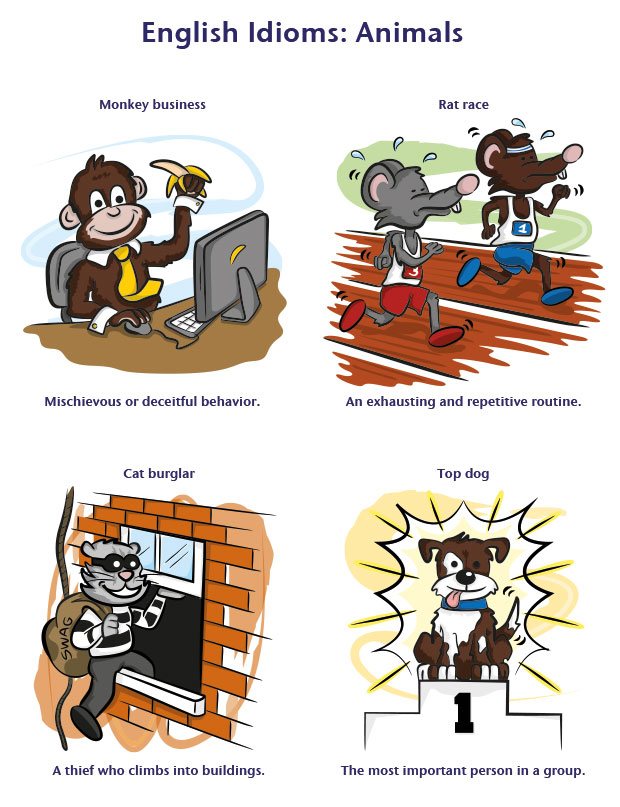
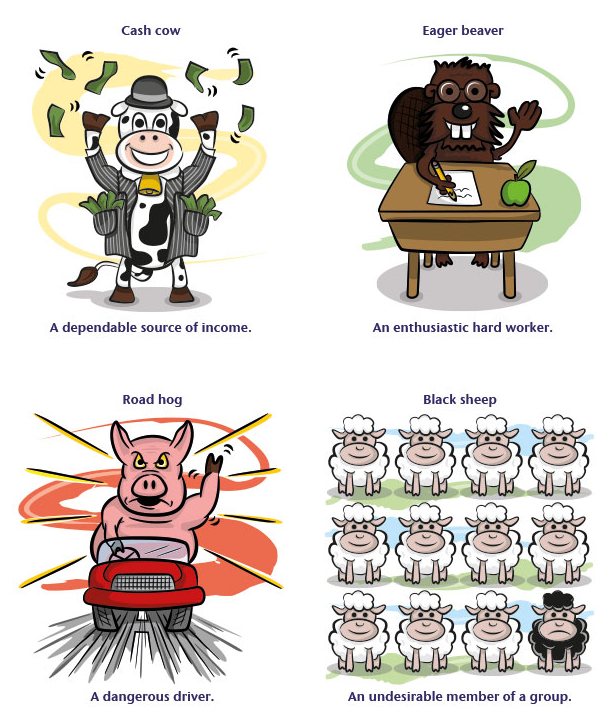
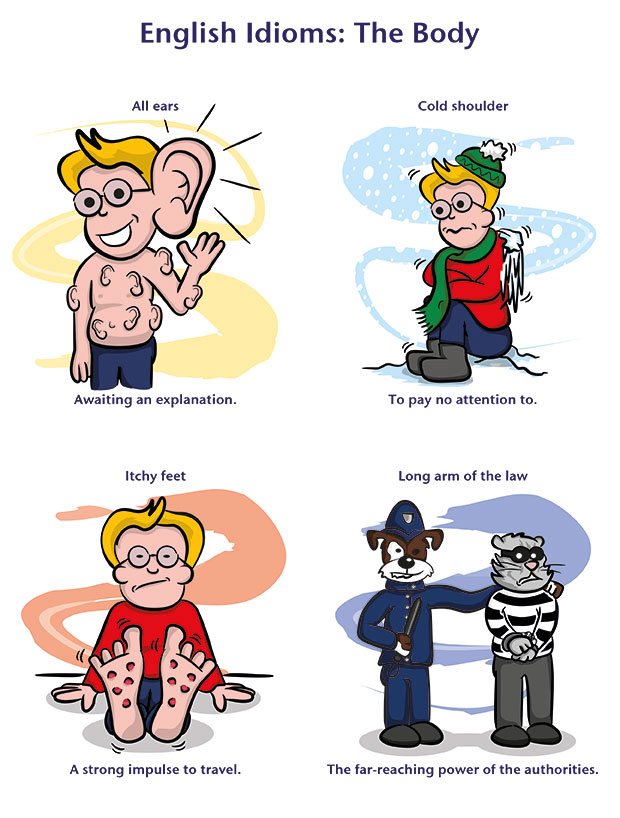
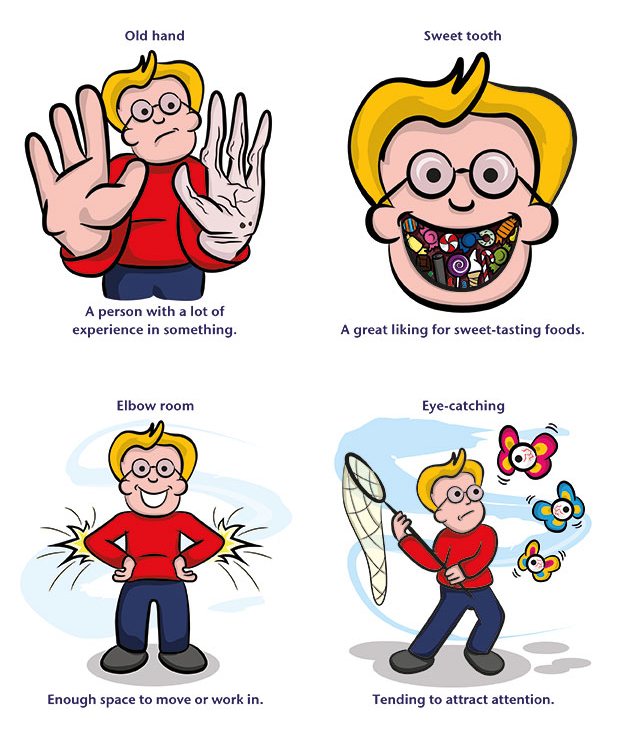
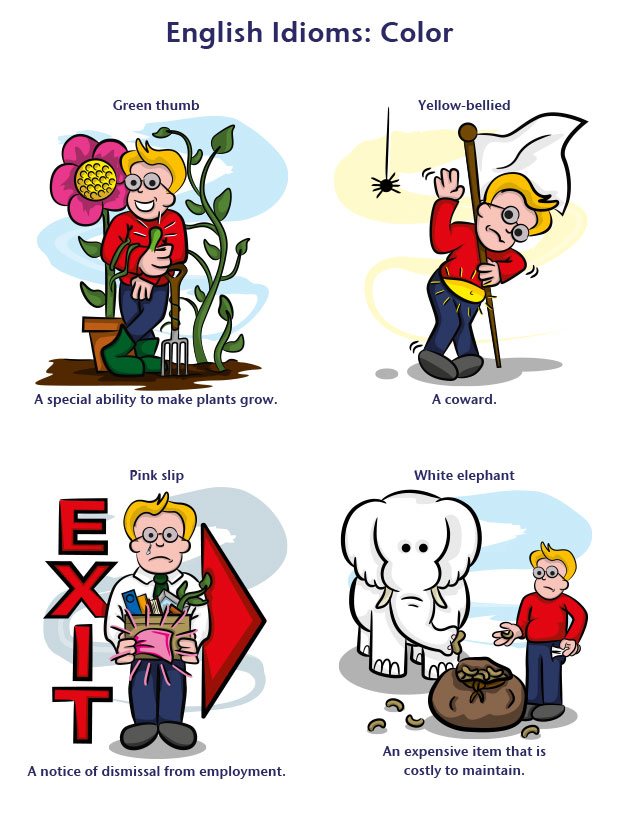 ..
..
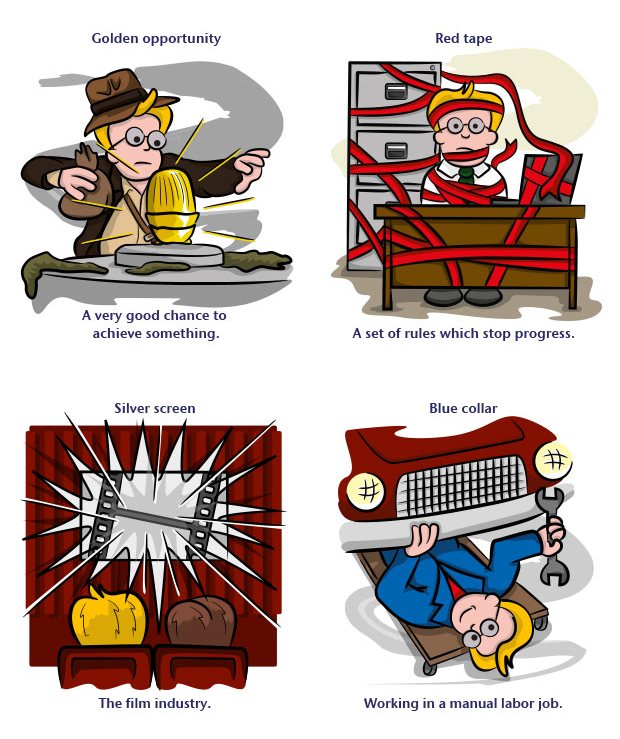
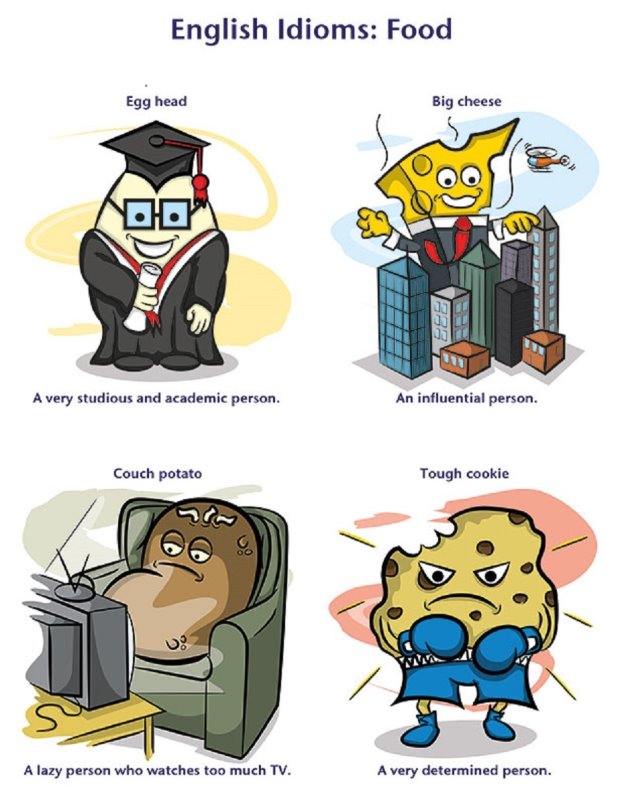
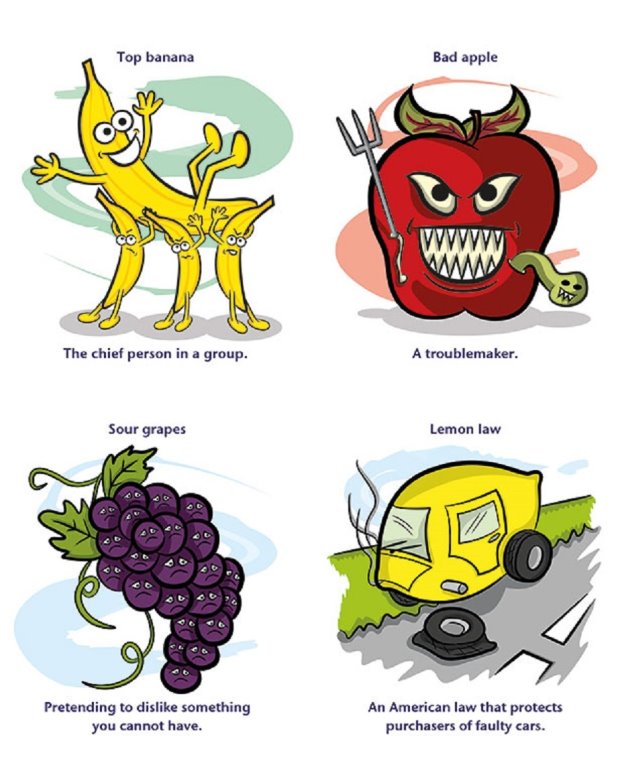
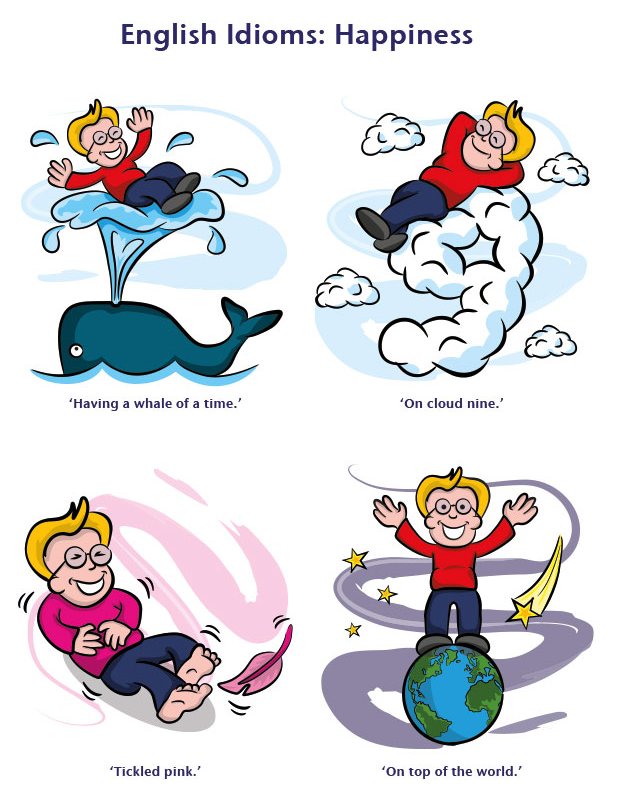
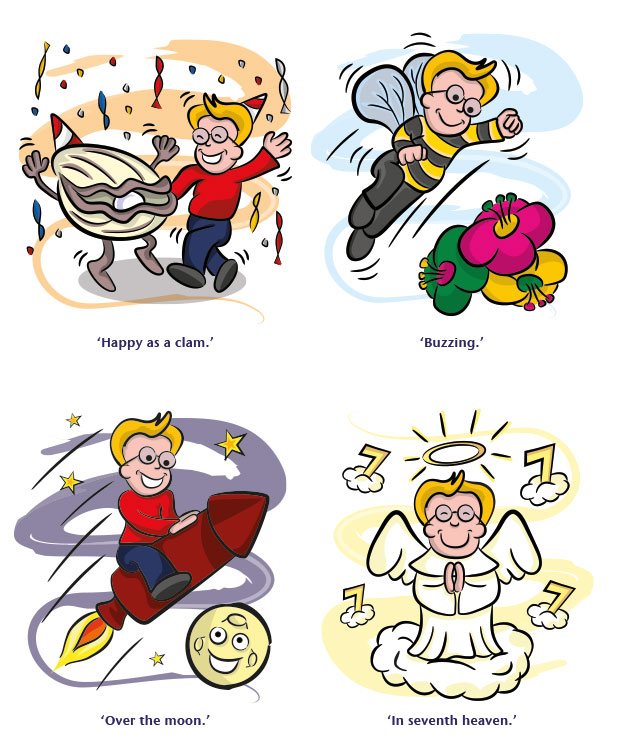
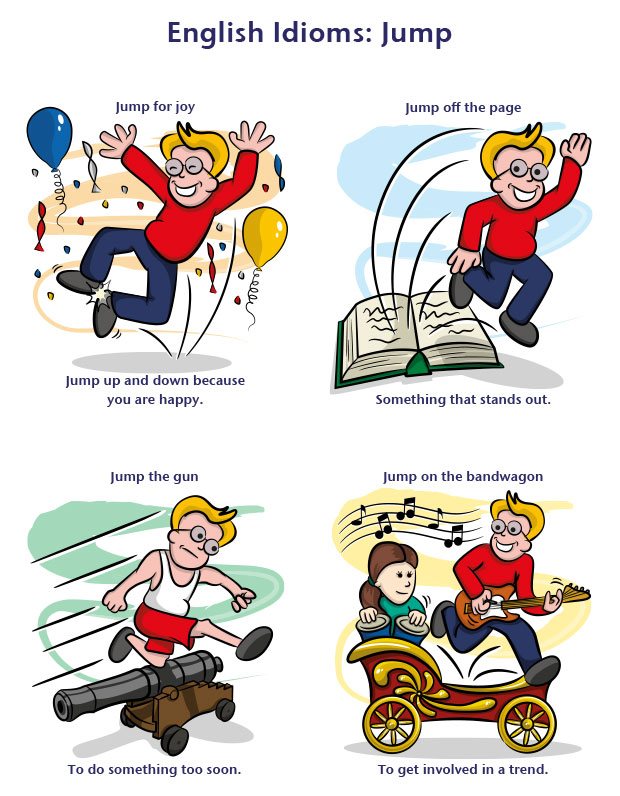

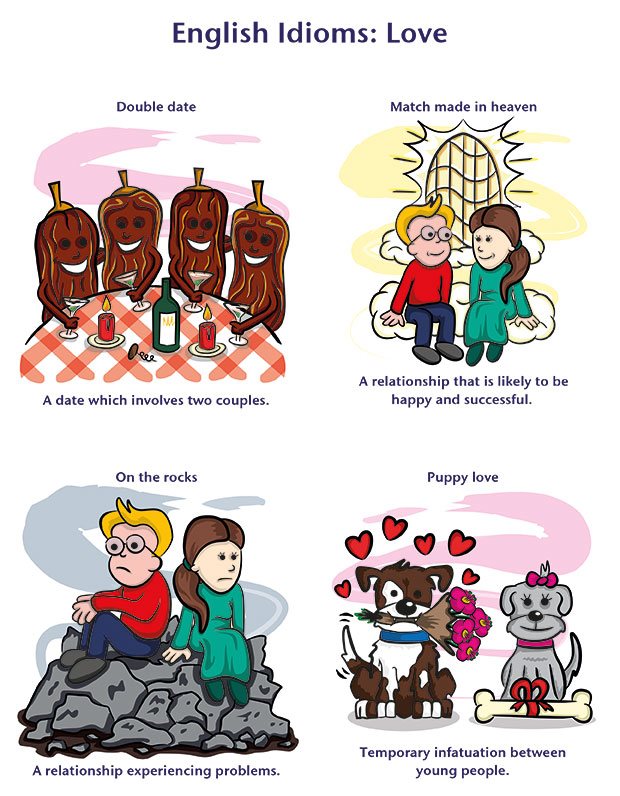
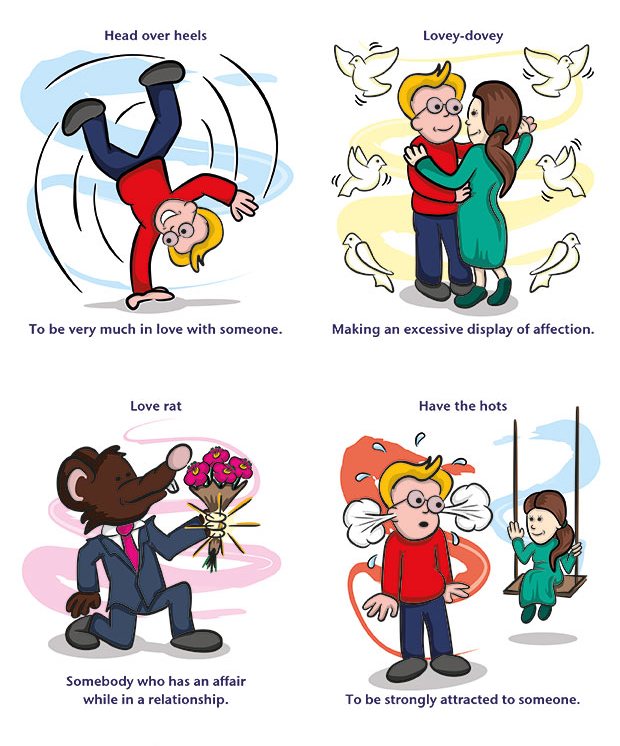
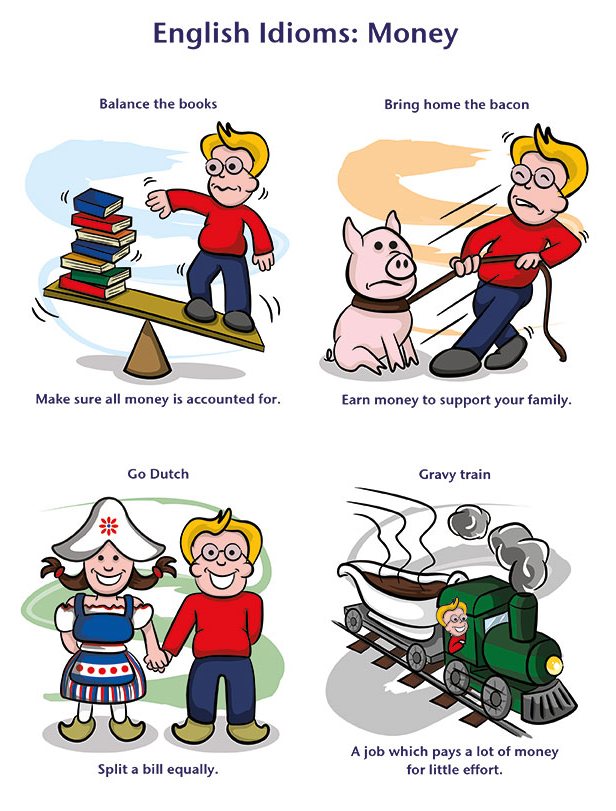
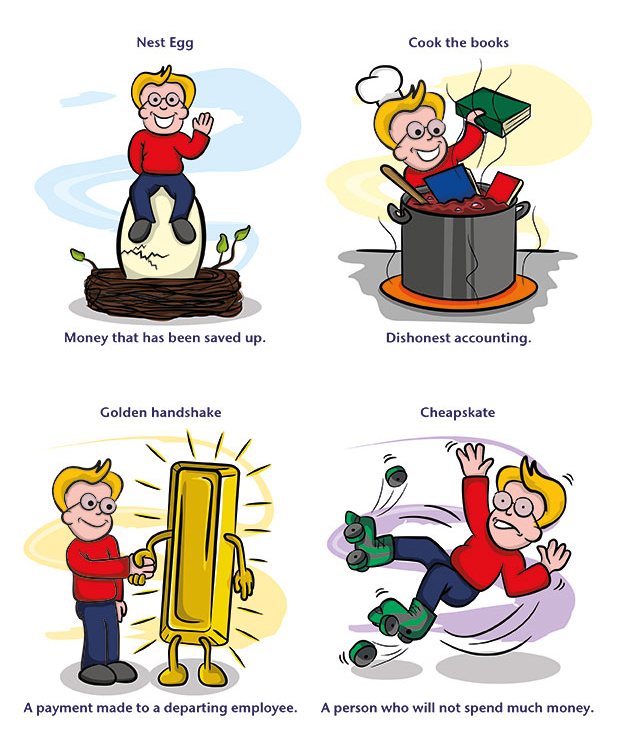
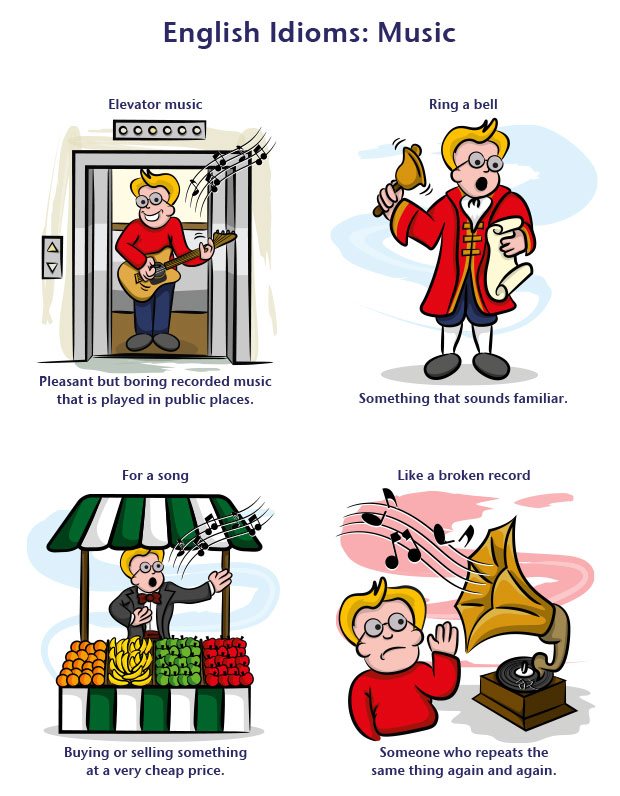
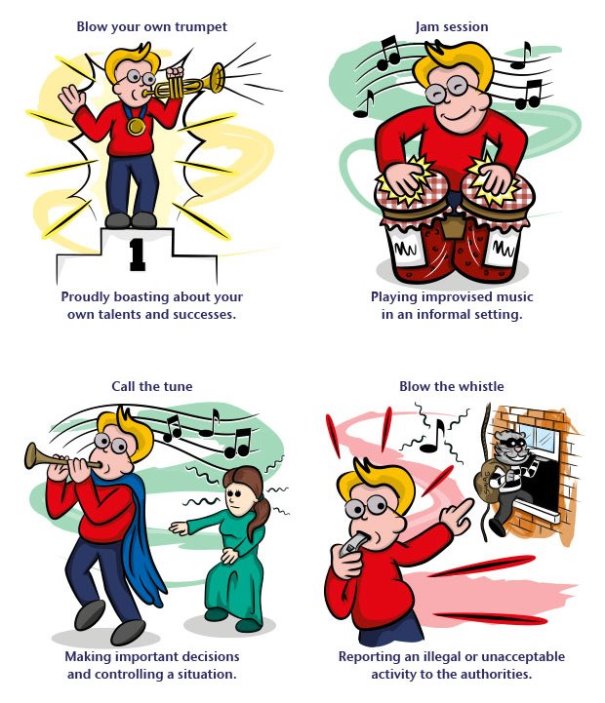
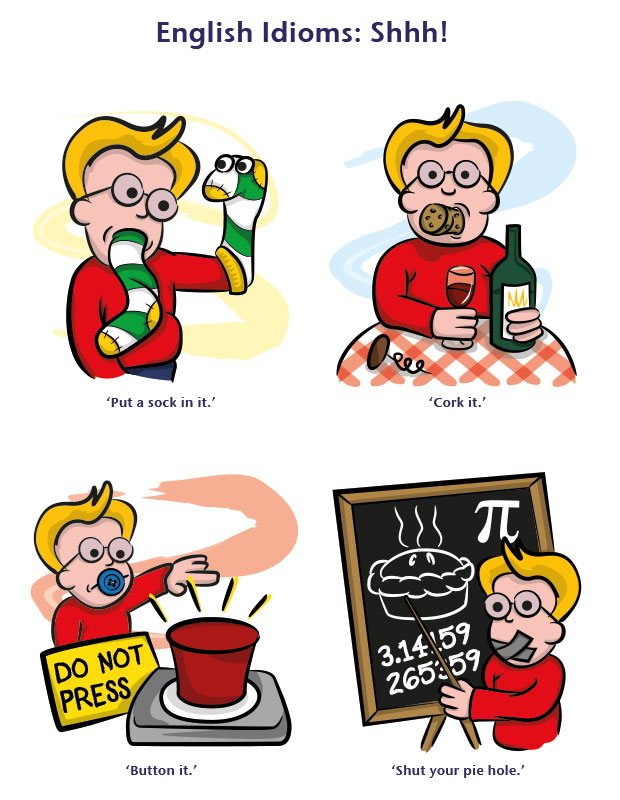
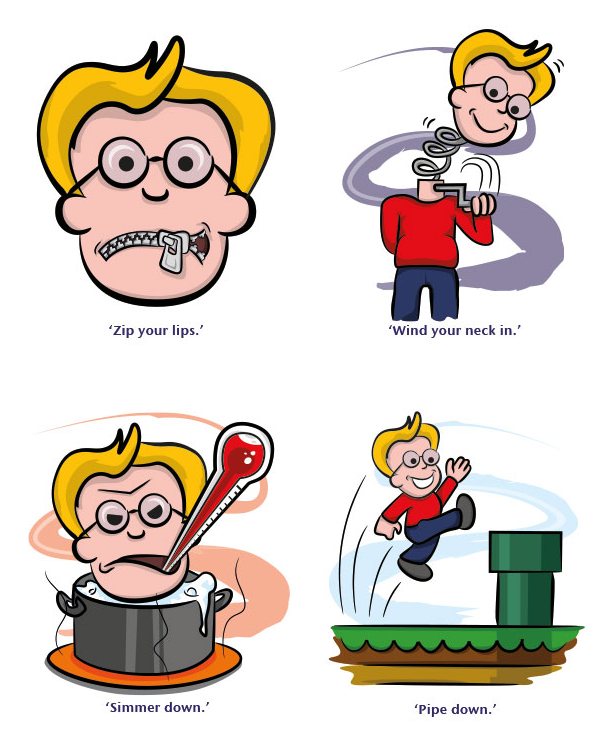
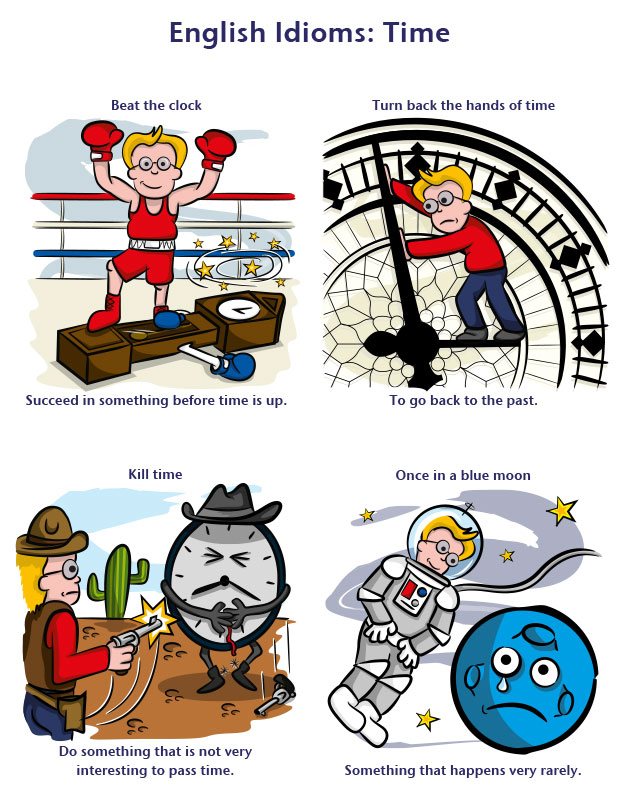
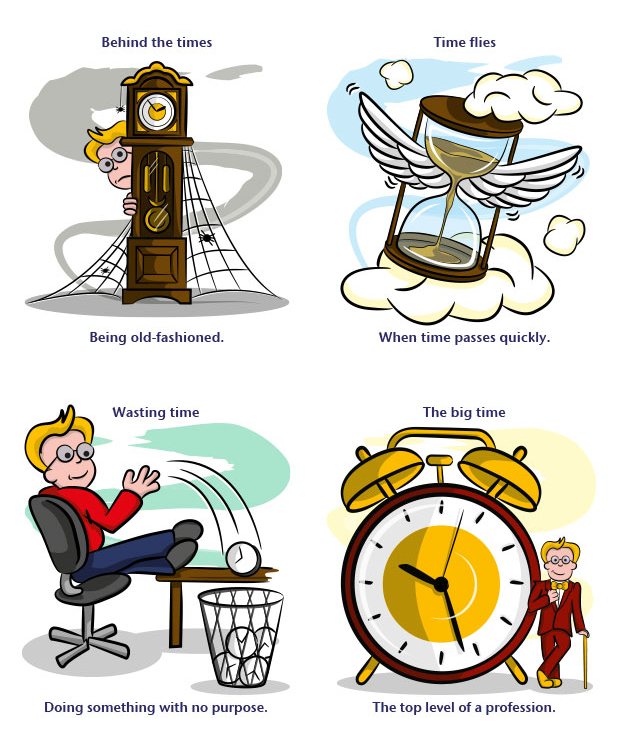
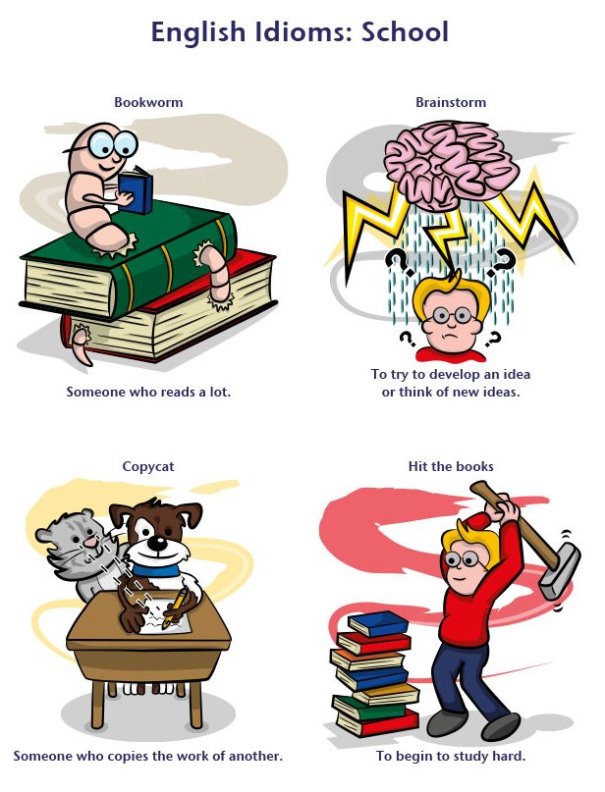
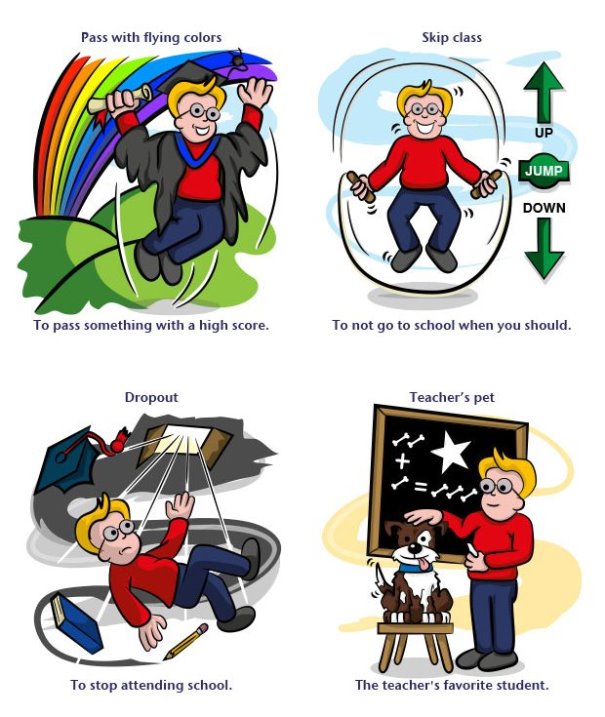
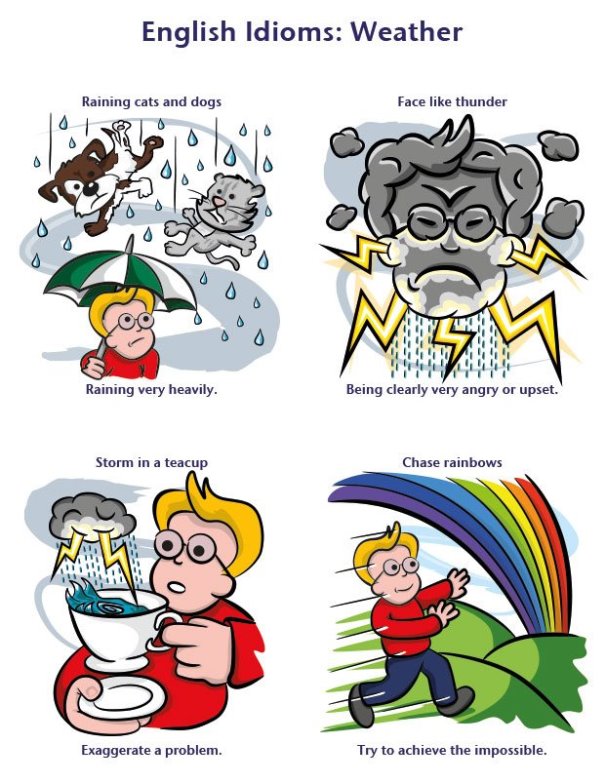
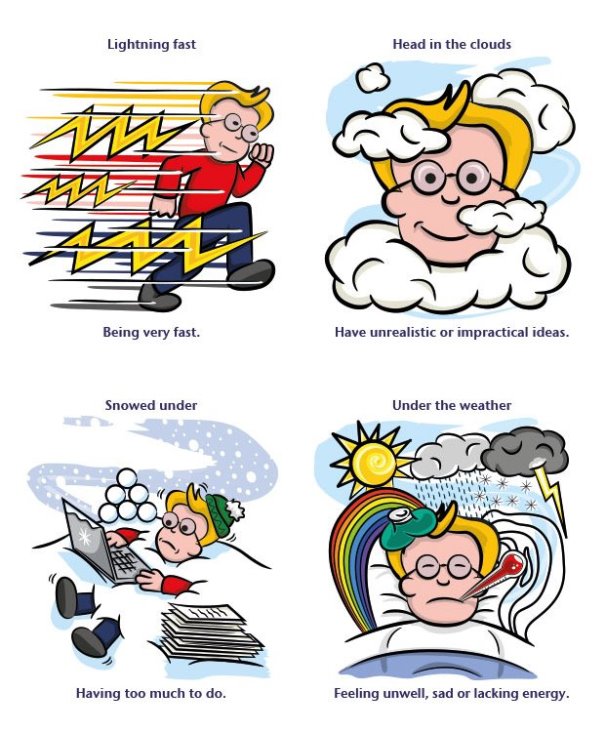
Bibliography
- Вінокуров А. М., Англо-український словник ідіом – «Мартин» Київ, 2011 – с. 5 – 530
- Кунин А.В. Англо-русский фразеологический словарь – 5-е издание, стереотип. – М., Рус. Яз. – Медиа, 2003
- Антрушина Г. Б., Афанасьева О. В., Морозова Н. Н., Лексикология английского языка – Москва, «Высшая школа», 1985 г., с. 173, с. 186
- Попов В. Ф. Читай и говори по-английски. Вып. 10, М. Воен-издат., 1974 г., издательство министерства обороны СССР – Москва – 1974, с.21, с.39, с. 76, с. 82, с. 91, с. 103, с. 115
- Вознюк Л. О. Англо-американські прислів’я та приказки (English – American Proverbs and Sayings) – Тернопіль: Підручники і посібники, 2008, с. 5, с. 10, с. 103, с. 146, с. 199
- Журнал Англія, с. 124, с. 128
- Газета Digest, 2002,
№2, с. 15
№ 4, с. 15№10 с. 15
Газета Digest, 2001,
№5-23, с. 15
- Longman Exam Dictionary Pearson Longman, с. 759
- Журнал «Іноземні мови», 2002 №2, стаття «Міні-словник ідіом та мовленнєвих
штампів для введення дискусії англійською мовою», с.41
10. http://www.nashaamerica.com/blogi/education/item-4058/
11. https://www.kaplaninternational.com/ru/blog/tag/angliiskie-idiomy
12. http://www.correctenglish.ru/reference/idioms/
1


про публікацію авторської розробки
Додати розробку
